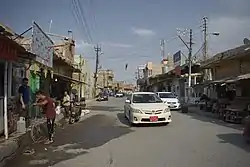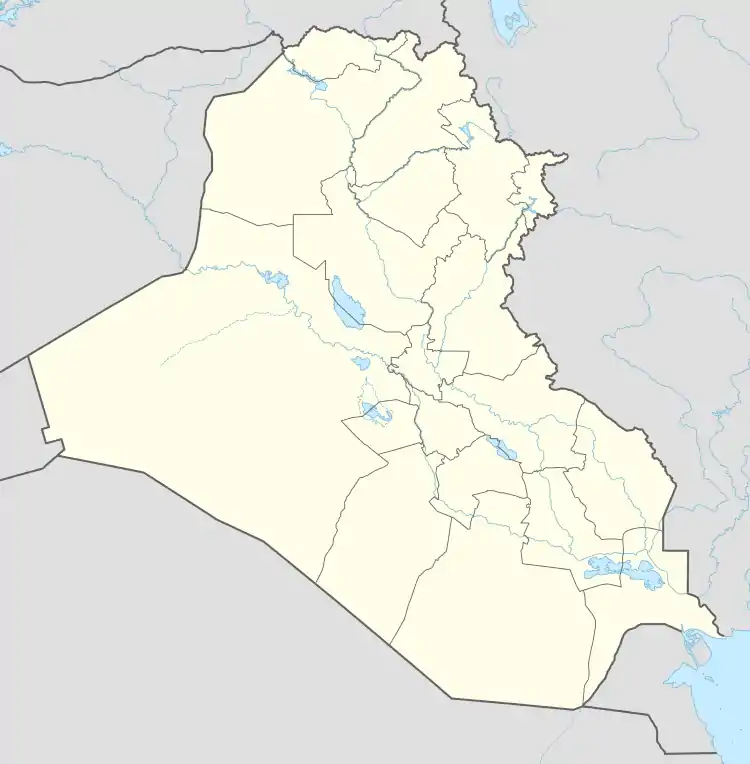Altun Kupri
Altun Kupri (Arabic: التون كوبري,[3] Turkish: Altınköprü, lit. 'Golden Bridge',[4] Kurdish: پردێ ,Pirdê[5][6]) is a town in Kirkuk Governorate, Iraq. Its inhabitants are predominantly Turkmen,[7][8] with a minority of Arab and Kurds.[9] It is located on the shores of the Little Zab and on the Erbil–Kirkuk road.[10][11] The town is described as having an 'intrinsic strategic significance'[12] and is disputed.[13]
Altun Kupri | |
|---|---|
Town | |
 | |
 Altun Kupri Location in Iraq | |
| Coordinates: 35°45′12″N 44°08′37″E | |
| Country | |
| Governorate | Kirkuk Governorate |
| District | Dibis |
| Elevation | 284 m (935 ft) |
| Population (2013)[2] | |
| • Total | 9,275 |
After the 2003 invasion of Iraq, the town was controlled by Peshmerga until the 2017 Iraqi-Kurdish conflict.[14][13]
Etymology
There are different theories on the Turkish name of the town. Some believe that the name 'Golden Bridge' refers to a Kurdish or Turkish woman of that name, while others believe it refers to the colorful caravans that passed the town and its bridge on their way between Mosul and Baghdad.[15]
History
Ottoman Murad IV built two bridges in the town which made it gain importance. It was visited by many European travellers and known for its scenery.[15]
Altun Kupri had about 400 and 500 households by the end of the 18th century. Mirza Abu Taleb Khan visited the town in 1799, describing it as a big village with a mixed Kurdish and Turkmen population busy with farming. Moreover, it was a trading center between Kurdistan and Baghdad for figs, grapes and other agricultural products. In 1906, the town had 4,000 inhabitants.[16] The Ottomans destroyed the town's famous stone-built bridges in 1918 and replaced by modern steel constructions.[15]
The town experienced Arabization during the Saddam era and an increased militarization to counter Kurdish nationalist activities from spreading towards Kirkuk city.[17]
More than a hundred Turkmens were massacred in 1991 during the Gulf War by the Iraqi Army.[18]
Kurdish community
Kurds constituted 70% of the population in 1947, while that number fell to 50% in 1957. In 1965, the percentage of Kurds fell further to 25.7% but increased again to 75.6% in 1977.[19] In the December 2005 parliamentary election, the Democratic Patriotic Alliance of Kurdistan received 80% of the vote in the sub-district of Altun Kupri.[20]
References
- "Maps, Weather, and Airports for Altun Kubri, Iraq". www.fallingrain.com. Retrieved Apr 3, 2019.
- "World Gazetteer # Altun kupri". Archived from the original on 2013-02-09. Retrieved 19 September 2013.
- "تركمان العراق يحييون الذكرى الـ28 لمجزرة "ألتون كوبري"". Anadolu Agency. 28 March 2019. Retrieved 29 October 2020.
- Blackie, Christina (1887-01-01). Geographical Etymology: A Dictionary of Place-names Giving Their Derivations. John Murray.
- "ناحیەی پردێ جارێكی دیكە ئاگر لە دەغڵودانی جوتیاران بەربوو" (in Kurdish). Retrieved 21 December 2019.
- "Pêşmerge: Li Pirdê pêşmergeyan êrîşên dagirkeran têk şikandin". Rûpela nû (in Kurdish). 20 October 2018. Retrieved 21 December 2019.
- "Iraq after ISIL: Kirkuk". Retrieved 26 October 2020.
- "Clashes between Kurdish and Iraqi forces near Erbil". The National News. 20 October 2017. Retrieved 29 October 2020.
- "Altun Kupri town, dated July 1919 / Catalog Record Only". Library of Congress. 1919. Retrieved 29 October 2020.
- "Kirkuk – Erbil road re-opens days after bridge maintenance". Kurdistan24. 8 April 2019. Retrieved 29 October 2020.
- Knights, Michael (2010). "Kirkuk in Transition Confidence Building in Northern Iraq" (PDF). Policy Focus. p. xi. Retrieved 26 October 2020.
- "Report: Altun Kupri town seized from Kurdish Peshmerga". Al Jazeera. 20 October 2017. Retrieved 29 October 2020.
- Kane, Sean (2011). "Iraq's Disputed Territories" (PDF). p. 51. Retrieved 24 October 2020.
- Longrigg, S.H. "Alti̊̊n (Altūn) Köprü". Encyclopaedia of Islam, Second Edition. doi:10.1163/1573-3912_islam_SIM_0568.
- Rasoul, Rasoul Muhammed (2017). "History of Kirkuk from the Beginning of the Nineteenth Century until Becoming Part of the Iraqi Monarchy in 1925" (PDF). University of Erfurt: 6–7. Cite journal requires
|journal=(help) - Knights, Michael (2010). "Kirkuk in Transition Confidence Building in Northern Iraq" (PDF). Policy Focus. p. 9. Retrieved 26 October 2020.
- "28 years on, Iraq's Kirkuk remembers Turkmen massacre". Anadolu Agency. 27 March 2019. Retrieved 29 October 2020.
- Ihsan, Mohammad, Administrative Changes in Kirkuk and Disputed Areas in Iraq 1968-2003, pp. 24–25
- Kane, Sean (2011). "Iraq's Disputed Territories" (PDF). p. 28. Retrieved 24 October 2020.
| Wikimedia Commons has media related to Altun Kupri. |